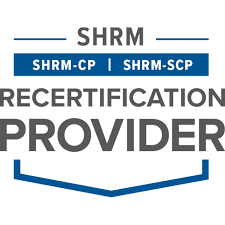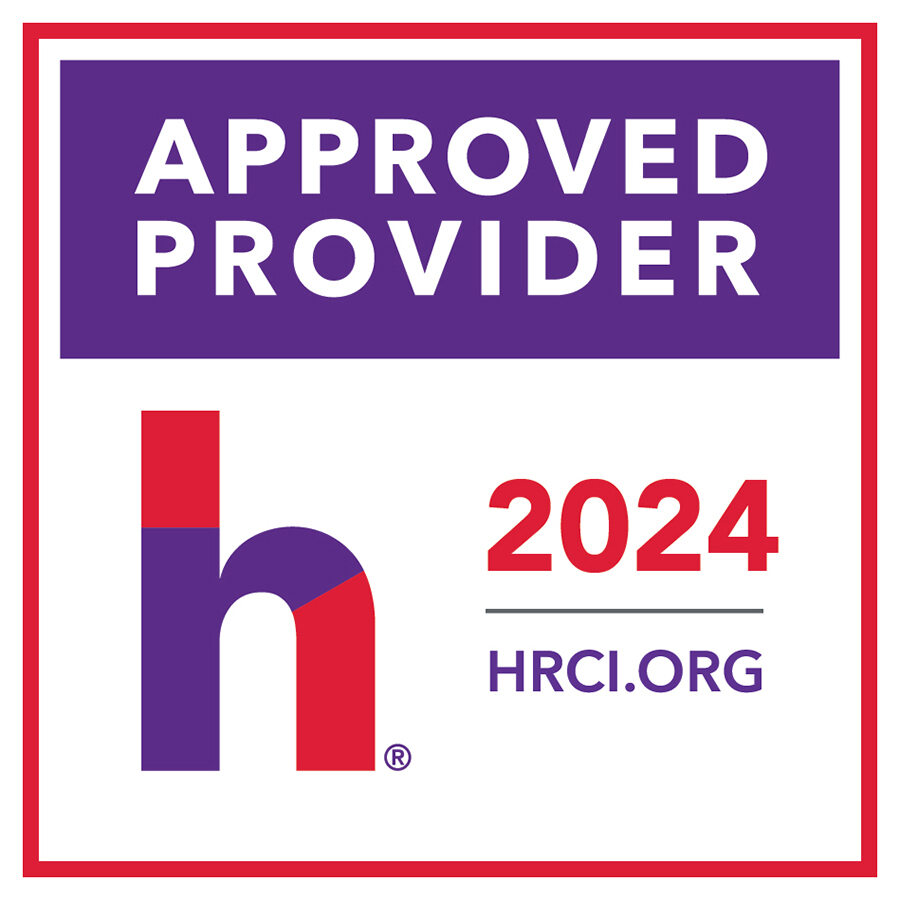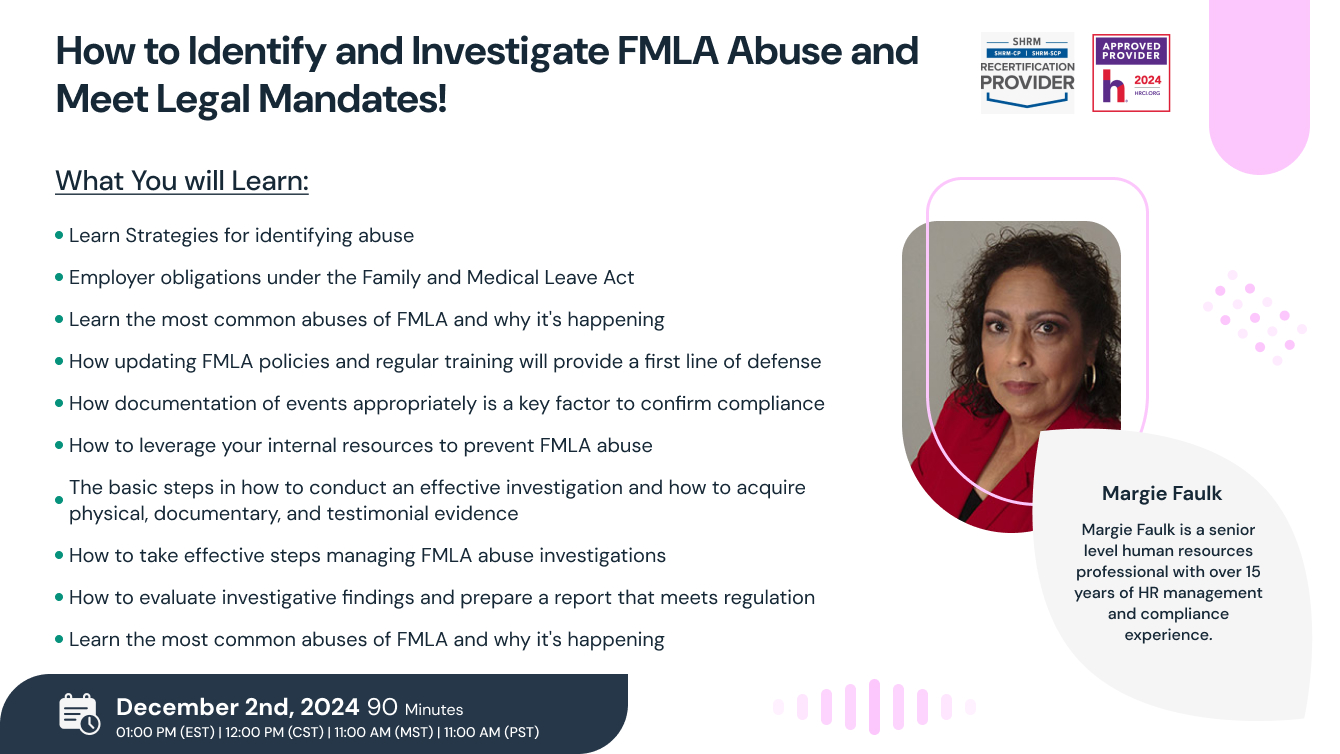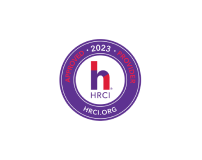Identifying and Investigating FMLA Abuse
It is unfortunate that HR professionals actually have to manage abuse of employee leave - but it is a reality, as more and more employees utilize the FMLA as a means to avoid disciplinary action for poor attendance and tardiness. But what can HR do? Well, a lot.
Even though the FMLA regulations are complex, confusing, and present loopholes that are easy to exploit, companies should not be reluctant to deny leave or terminate troublesome employees for fear of being sued.
FMLA abuse is an issue wherein employees take undue time off by abusing the Family and Medical Leave Act rights. It is often challenging to end it because so many rules protect employee rights.
The FMLA, or the Family and Medical Leave Act, may grant up to 12 weeks of unpaid leave to specific staff members employed by covered employers each year. Companies must also offer health benefits when the worker is working actively. Public organizations, including state, local and national companies and public school systems, are examples of covered employers.
Why You Should Attend
Unfortunately, FMLA (Family and Medical Leave Act) abuse occurs. When companies do catch it, the cases frequently end up in court, where the company can only prevail if they can show that they meticulously recorded the leave, carried out a comprehensive inspection and were able to establish beyond a possible suspicion that the abuse occurred.
Although employee rights are well guarded, you, as an employer, have legal options available when dealing with FMLA abuse, provided you have substantial proof to back up your claims. With the correct strategy and workforce management, you won’t need to worry about FMLA abuse cases much.
What You will Learn
- Learn Strategies for identifying abuse
- Learn how to identify, investigate and meet compliance standards
- Learn Employer obligations under the Family and Medical Leave Act
- Learn the most common abuses of FMLA and why it's happening
- Learn how updating FMLA policies and regular training will provide a first line of defense
- Learn how documentation of events appropriately is a key factor to confirm compliance
- How to leverage your internal resources to prevent FMLA abuse
- Learn who are the individuals you need to involve in an internal investigation
- The basic steps in how to conduct an effective investigation and how to acquire physical, documentary, and testimonial evidence
- Learn how you can confirm compliance of FMLA by 3rd party vendors
- Learn when you can effectively terminate an employee during FMLA
- How to take effective steps managing FMLA abuse investigations
- How to evaluate investigative findings and prepare a report that meets regulation
Who will Benefit
- All Employers with 50+ employees
- All Employers with 40+ employees who will meet FMLA requirement by the next year
- Company Leadership
- Compliance professionals
- Payroll Administrators
- HR Professionals
- Managers
- Supervisors

Margie Faulk
Margie Faulk is a senior level human resources professional with over 15 years of HR management and compliance experience. A current Compliance Advisor for HR Compliance Solutions, LLC, Margie, has worked as an HR Compliance advisor for major corporations and small businesses in the small, large, private, public, Non-profit sectors and International compliance. Margie has provided small to large businesses with risk management strategies that protect companies and reduces potential workplace fines and penalties from violation of employment regulations. Margie is bilingual (Spanish) fluent and Bi-cultural. Margie’s area of expertise includes Criminal Background Screening Policies and auditing, I-9 document correction and storage compliance, Immigration compliance, employee handbook development, policy development, sexual harassment investigations/certified training, SOX regulations, payroll compliance, compliance consulting, monitoring US-based federal, state and local regulations, employee relations issues, internal investigations, HR management, compliance consulting, internal/external audits, and performance management. Margie’s unique training philosophy includes providing free customized tools for all attendees. These tools are customized and have been proven to be part an effective risk management strategy. Some of the customized tools include the I-9 Self Audit. Correction and Storage program, Ban the Box Decision Matrix Policy that Employers can provide in a dispute for allegations, Family Medical Leave Act (FMLA) Compliance Guide, Drug-Free Workplace Volatile Termination E-Book and other compliance program tools when attendees register and attend Margie’s trainings. Margie holds professional human resources certification (PHR) from the HR Certification Institution (HRCI) and SHRM-CP certification from the Society for Human Resources Management. Margie is a member of the Society of Corporate Compliance & Ethics (SCCE).

SHRM -
StandEagle is recognized by SHRM to offer Professional Development Credits (PDCs) for the SHRM-CPSM or SHRM-SCPSM. This program is valid for 1.5 PDCs for the SHRM-CPSM or SHRM-SCPSM. For more information about certification or recertification, please visit - portal.shrm.org.

HRCI -
This webinar has been approved for 1.5 HR (General) re-certification credit hours toward California, GPHR, HRBP, HRMP, PHR, and SPHR recertification through the HR Certification Institute.
The use of this seal is not an endorsement by the HR Certification Institute of the quality of the activity. It means that this activity has met the HR Certification Institute’s criteria to be pre-approved for re-certification credit.

ACCREDITATIONS


